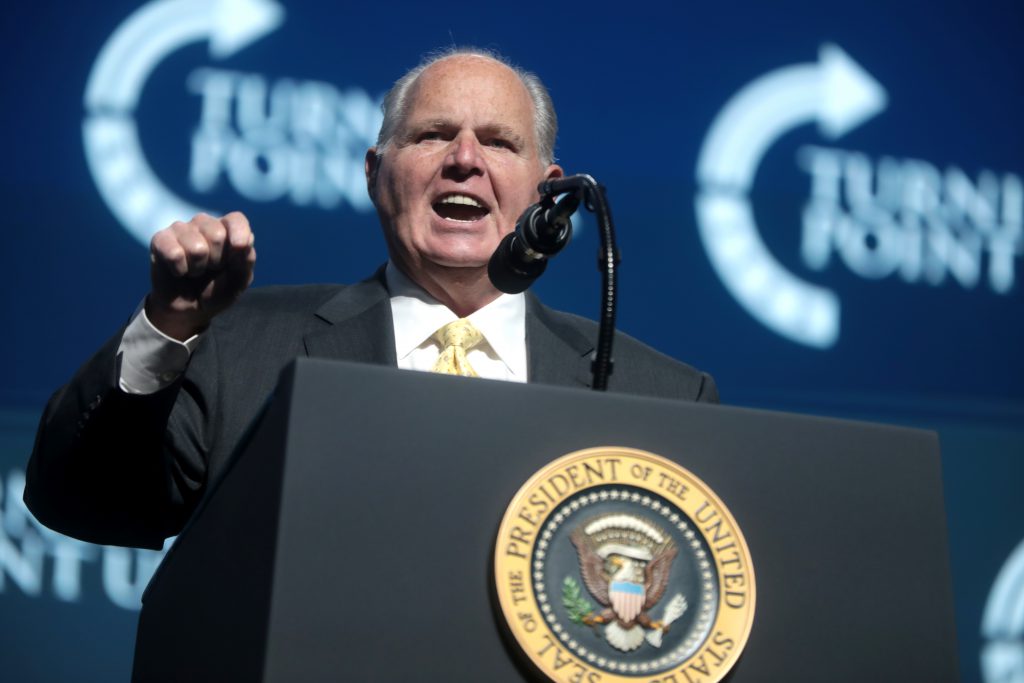Honoring Limbaugh But Not Black History
Republican legislators back resolution to honor Rush, resist celebrating Black History Month.

Rush Limbaugh. Photo by Gage Skidmore from Surprise, AZ, United States of America, (CC BY-SA 2.0), via Wikimedia Commons
In February, following a global movement to affirm that Black Lives Matter, Republicans rejected a resolution honoring Black History Month because they didn’t like all of the names of people being honored on the resolution.
Most notably, the conflict centered on the names of people of color who were killed by police. According to Sen. Lena Taylor (D-Milwaukee), they also did not approve of honoring Wisconsin native and Georgia politician and organizer Stacey Abrams.
The Limbaugh resolution is cosponsored by 20 representatives, including Speaker Robin Vos, a sure indication the resolution, honoring someone who described Black people in an overtly racist manner, will pass in the same body that refused to acknowledge Black History Month. Limbaugh died on Feb. 17, 2021.
Limbaugh spearheaded the fake birther conspiracy challenging President Barack Obama’s nationality, and said Obama and Oprah Winfrey were only successful because they are Black. Limbaugh’s other infamous insults to Black Americans include:
“Have you ever noticed how all composite pictures of wanted criminals resemble Jesse Jackson?”
“…the NFL all too often looks like a game between the Bloods and the Crips without any weapons. There, I said it.”
“The NAACP should have riot rehearsal. They should get a liquor store and practice robberies.”
Speaking to an African American female caller, “Take that bone out of your nose and call me back.”
There are also four Senate cosponsors: Sens. Andre Jacque (R-Whitewater), Kathy Bernier (R-Chippewa Falls), Steve Nass (R-Whitewater) and Julian Bradley (R-Franklin), the only Black Republican in the Wisconsin State Legislature.
The resolution praises Limbaugh:
- As “a talk radio pioneer beloved by millions of loyal listeners for his ardent defense of conservative politics.”
- For his youth broadcasting experience, starting as a disc jockey in high school.
- As “a lawyer and Republican activist.”
- For his focus and job in baseball, as “director of sales and special events for the Kansas City Royals.”
- For launching the ‘Rush Limbaugh Show’ in 1988, starting a 32-year run “as one of the nation’s highest-rated talk radio programs.
- His “unforgettable voice touched people from many backgrounds, galvanizing support for conservative policies.”
- For getting a heartfelt tribute from former President Donald Trump.
The resolution on Black History Month would have recognized:
- Vice President Kamala Harris, baseball legend Hank Aaron, Georgia’s Stacey Abrams and 32 other Black Americans;
- Jay Anderson, Jr., Daniel Bell, Jacob Blake, Alvin Cole, Dontre Hamilton, Ernest Lacy, Tony Robinson and Sylville Smith — eight Wisconsinites who were killed or permanently disabled by interactions with the police.
The Black History Month resolution begins, “Whereas, Black History Month provides a deliberate opportunity to reflect on the common humanity underlying all people and to raise awareness and foster respect for the heritage and contributions of people of African descent.” It also notes that “this year marks over 400 years since the arrival of enslaved Africans in Virginia.”
In a column, Sen. Taylor wrote about her feelings on the conflict over the Black History Month resolution, explaining that Black legislators were told who they could and couldn’t honor; Legislative Black Caucus members eventually exited talks with Republicans who made these demands.
Taylor continued: “The hypocrisy becomes stifling after a while. Republicans can request that the Wisconsin flag be lowered to honor the death of an openly racially divisive Rush Limbaugh but refuse to have Colin Kaepernick’s name for kneeling to raise awareness about Black lives. Another Republican legislator thought that Black History Month was about honoring white Abolitionists. This year, we simply said ‘Not today,” not on someone else’s terms or preferences.’”
Another resolution debate on the horizon that may — or may not — draw opposition from Republicans comes from Sen. Tim Carpenter (D-Milwaukee), who introduced a resolution proclaiming March 31 as Wisconsin’s Transgender Day of Visibility, to coincide with the international celebration of the day.
His resolution lists many Wisconsin transgender leaders and groups he hopes to recognize, including Alina Boyden, Shannon Andrews, Elle Halo’s work in health care, actor Rachel Crowl, Wisconsin veteran Col. Sheri Swokowski and political elected officials and candidates Zoe Roberts, Vered Meltzer, Jessica Katzenmeyer and Wendy Bolm. It also commends the advocacy groups Diverse and Resilient, FORGE, SHEBA and GSAFE.
This resolution affirms that “everyone has a role to play in making our communities places where transgender and gender-nonconforming people are welcomed, supported, and have the opportunity to thrive.” It also acknowledges that “our transgender and nonbinary neighbors in Wisconsin have shown great strength in the face of adversity and empower others to explore and embrace their full selves by living their truth.”
Reprinted with permission of Wisconsin Examiner.
If you think stories like this are important, become a member of Urban Milwaukee and help support real, independent journalism. Plus you get some cool added benefits.
Op-Ed
-
Unlocking Milwaukee’s Potential Through Smart Zoning Reform
 Jul 5th, 2024 by Ariam Kesete
Jul 5th, 2024 by Ariam Kesete
-
We Energies’ Natural Gas Plans Are A Mistake
 Jun 28th, 2024 by John Imes
Jun 28th, 2024 by John Imes
-
Milwaukee Needs New Kind of School Board
 Jun 26th, 2024 by Jordan Morales
Jun 26th, 2024 by Jordan Morales





















